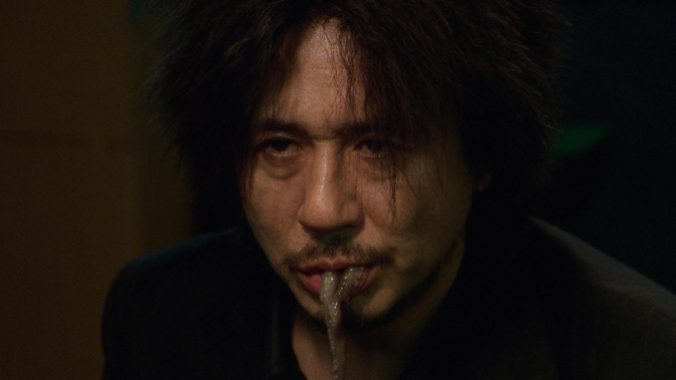Triple Threat: Park Chan-wook’s Vengeance Trilogy
The rapid-fire trilogy stared into the abyss of revenge and conquered the early ’00s.

A story has a beginning, a middle, and an end. Maybe that’s why the trilogy is such a satisfying structure for so many epic series or curious corners of cinema history. This year in Triple Threat, Ken Lowe revisits another of cinema’s best trilogies each month, including some unofficial trilogies that have come to define a director, actor, or time in film history. You can follow the series here.
When I was in college, I covered a court case for the school newspaper in which a woman had attempted to pass a car in terrible weather on a one-lane highway, and had caused a head-on collision that killed two college students. She survived, and I was to write about her sentencing—listening to the family members of the slain people stand up and speak their piece to her before the judge handed down a ruling. I don’t remember what her penalty was (there was no jail), only that those I told it to later said she’d gotten off light. It should’ve been the death penalty, one person said to me.
But it shouldn’t have been. The families, who were there that day, did not want that—I didn’t even need to ask them to know. That would be awful, and meaningless, even if any punishment devised by any god or man could be worse than living with what she’d so carelessly done. I saw on her face, as she sat there in court, that no such penalty ever could.
Revenge might really be why we are the way we are. Not individually, but as a people. You can argue that preventing it, thwarting it, deterring it, is the entire impetus for why we have things like laws and a societal order—why our judicial system does not extract an eye for an eye. In a world where there is no inherent fairness or justice but what we come together collectively to create and enforce, the question of vengeance hangs over everything. Our fiction constantly prosecutes the question of where justice becomes vengeance.
A lot of it really wants to have it both ways, though: Bemoaning vengeance as an evil, but rooting for the wronged protagonist as they rip and tear until it is done. Park Chan-wook’s Vengeance Trilogy definitively and completely rejects that framing—but oh, how it tantalizes you with it, entrapping you before the big, awful reveal. Across three movies in the early ‘00s, his features Sympathy for Mr. Vengeance, Oldboy and Lady Vengeance asked viewers if they wanted to see some fucking vengeance, and then made them choke on it. These are beautiful movies that linger in the very ugliest places, and were ultimately one of the mightiest salvos in the new wave of Korean cinema that characterized the turn of the millennium.
The Movies
“I said from the start, I wanted the film to be felt physically, not just emotionally. I wanted the audience to be tired when they finished the film. I wanted their bodies to be tired.” — Park Chan-wook on Oldboy
Park Chan-wook’s best-known works emerged during a boom in Korean film production that followed the end of South Korean leader Chun Doo-hwan’s decades-long military dictatorship. Park was in college during the protests against Chun’s government, and in interviews has spoken about how the violence and repression of the time shattered his otherwise fairly comfortable upbringing. It also caused him, in the years after, to meditate on the feelings of rage curdling inside of him, feelings he said caused “the collapse of our internal self.”
It’s as succinct a way of summing up these three films as any: Protagonists whose selves are subsumed entirely in service of their quests to get back at those who have wronged them.
The other major influence Park has cited, in the case of Sympathy for Mr. Vengeance, is the 1997 financial crisis that affected Asian countries, and in South Korea fueled a growing social divide. In that first film, a fired factory worker, Ryu (Shin Ha-kyun), attempts to sell his own kidney in an attempt to help his sister afford her own kidney transplant. When the organ dealers rip him off, Ryu hatches a plot that eventually involves him kidnapping the daughter of a wealthy man. Through a series of mishaps, the child is drowned, and Ryu’s sister, discovering his part in it, soon takes her own life. The movie ends as the kidnapped girl’s father (Song Kang-ho of Parasite fame) takes justice into his own hands… before the associates of Ryu’s slain girlfriend then take justice into their own hands. Park has said he consciously chose minimalistic camera setups, going for simple movement and elemental framing. It makes the few times in the movie when the violence explodes seem all the more unnerving for its matter-of-factness.
The following year, Park was at it again with Oldboy. The more stylized movie is based somewhat loosely on a manga, with the crucial difference that the movie’s twin twists in the third reel were invented by Park and his co-writers. (Speaking to The Hollywood Reporter in 2023, he said the epiphany came to him during a bathroom break while he and his co-producers were trying to figure out a better rationale behind the maddening revenge at the story’s center.)
-

-

-

-

-

-

-

-

-

-

-

-

-

-

-

-

-

-

-

-

-

-

-

-

-

-

-

-

-

-

-

-

-

-

-

-

-

-

-

-








































